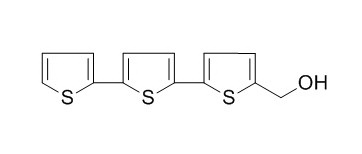alpha-Terthienylmethanol
Alpha-terthienylmethanol possesses potent cytotoxic activity against human endometrial cancer cells; it inhibits growth mediated by the induction of apoptosis, as shown by the accumulation of sub-G1 and apoptotic cells.
Inquire / Order:
manager@chemfaces.com
Technical Inquiries:
service@chemfaces.com
Tel:
+86-27-84237783
Fax:
+86-27-84254680
Address:
1 Building, No. 83, CheCheng Rd., Wuhan Economic and Technological Development Zone, Wuhan, Hubei 430056, PRC
Providing storage is as stated on the product vial and the vial is kept tightly sealed, the product can be stored for up to
24 months(2-8C).
Wherever possible, you should prepare and use solutions on the same day. However, if you need to make up stock solutions in advance, we recommend that you store the solution as aliquots in tightly sealed vials at -20C. Generally, these will be useable for up to two weeks. Before use, and prior to opening the vial we recommend that you allow your product to equilibrate to room temperature for at least 1 hour.
Need more advice on solubility, usage and handling? Please email to: service@chemfaces.com
The packaging of the product may have turned upside down during transportation, resulting in the natural compounds adhering to the neck or cap of the vial. take the vial out of its packaging and gently shake to let the compounds fall to the bottom of the vial. for liquid products, centrifuge at 200-500 RPM to gather the liquid at the bottom of the vial. try to avoid loss or contamination during handling.
Plant Foods Hum Nutr.2021, 76(4):472-477.
J Pharm Biomed Anal.2023, 234:115570.
Plants.2024, 13(10):1348;
Oxid Med Cell Longev2019, 9056845:13
Plants (Basel).2021, 10(2):278.
Turkish Journal of Pharmaceutical Sciences2022, DOI: 10.4274
Prev Nutr Food Sci.2024, 29(4):563-571.
Food Chem Toxicol.2020, 135:110863
FASEB J.2019, 33(8):9685-9694
Int J Mol Sci.2024, 25(17):9730.
Related and Featured Products
J Ethnopharmacol. 2015 May 1.
α-Terthienylmethanol, isolated from Eclipta prostrata, induces apoptosis by generating reactive oxygen species via NADPH oxidase in human endometrial cancer cells.[Pubmed:
25940205]
Eclipta prostrate L. (syn. E. alba Hassk), commonly known as False Daisy, has been used in traditional medicine in Asia to treat a variety of diseases, including cancer. Although an anti-tumor effect has been suggested for E. prostrata, the exact anti-tumor effects and underlying molecular mechanisms of its bioactive compounds are poorly understood. The aim of this study was to identify compounds with anti-cancer activity from E. prostrata and to investigate their mechanism of action.
METHODS AND RESULTS:
To assess cell viability, cell cycle progression, and apoptosis, we performed MTT assays and FACS analysis using Annexin and PI staining. We also investigated reactive oxygen species (ROS) production and caspase activation using flow cytometry and Western blot analysis, respectively. Cytosolic translocation of cytochrome c was measured using an ELISA kit. Antioxidants, MAPK signaling inhibitors, NADPH oxidase inhibitors, and siRNA were used to elucidate the molecular mechanism of action of the compound. We isolated five terthiophenes from the n-hexane fraction of E. prostrata; of these, α-terthienylmethanol possessed potent cytotoxic activity against human endometrial cancer cells (Hec1A and Ishikawa) (IC50<1μM). The growth inhibitory effect of alpha-Terthienylmethanol was mediated by the induction of apoptosis, as shown by the accumulation of sub-G1 and apoptotic cells. In addition, alpha-Terthienylmethanol triggered caspase activation and cytochrome c release into the cytosol in a time-dependent manner. Moreover, alpha-Terthienylmethanol increased the intracellular level of ROS and decreased that of GSH, and the antioxidants N-acetyl-l-cysteine and catalase significantly attenuated alpha-Terthienylmethanol-induced apoptosis. We further demonstrated that inhibition of the NADPH oxidase attenuated alpha-Terthienylmethanol-induced cell death and ROS accumulation in endometrial cancer cells.
CONCLUSIONS:
Overall, these results suggest that alpha-Terthienylmethanol, a naturally occurring terthiophene isolated from E. prostrata, induces apoptosis in human endometrial cancer cells by ROS production, partially via NADPH oxidase.



